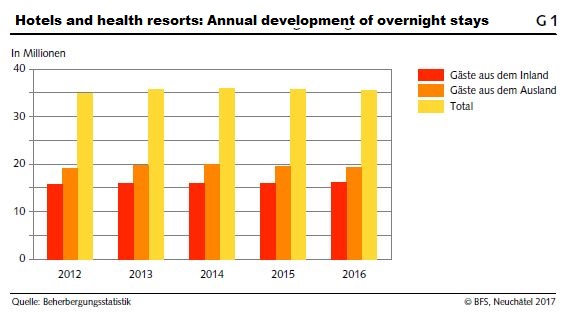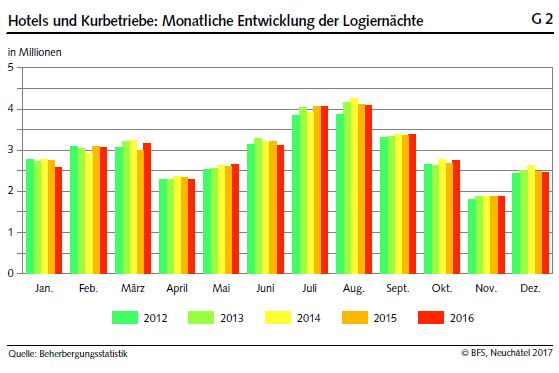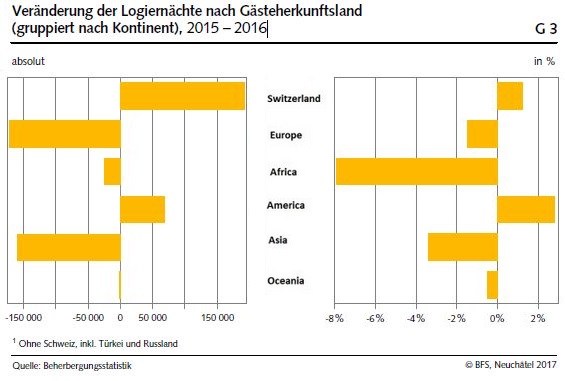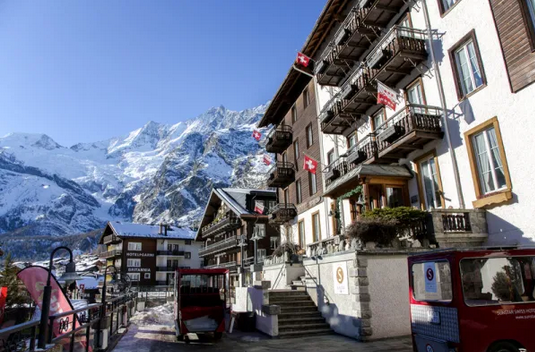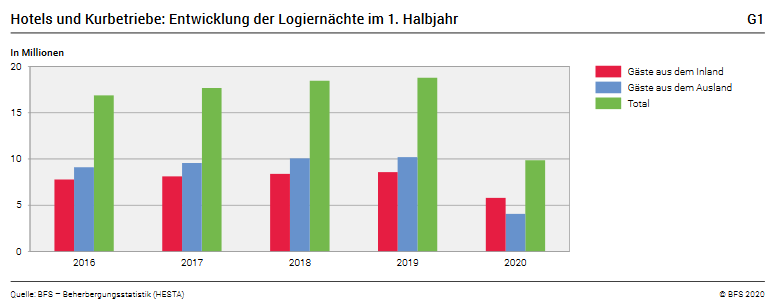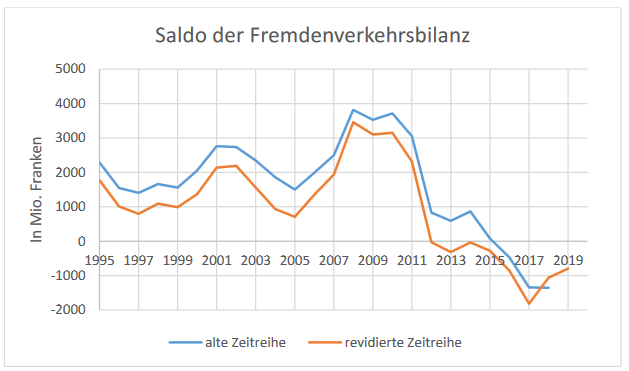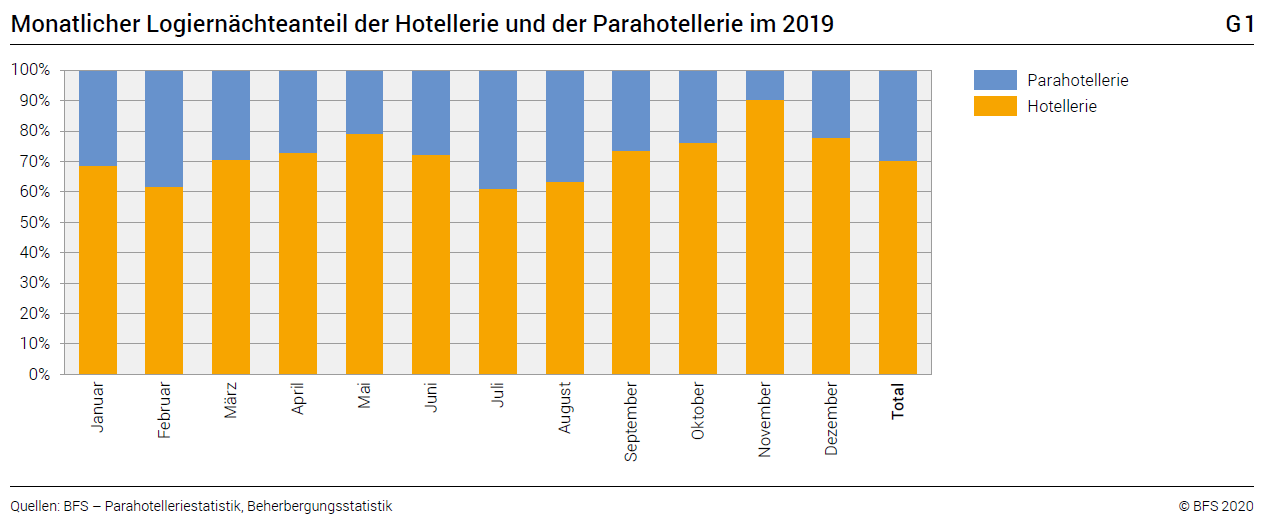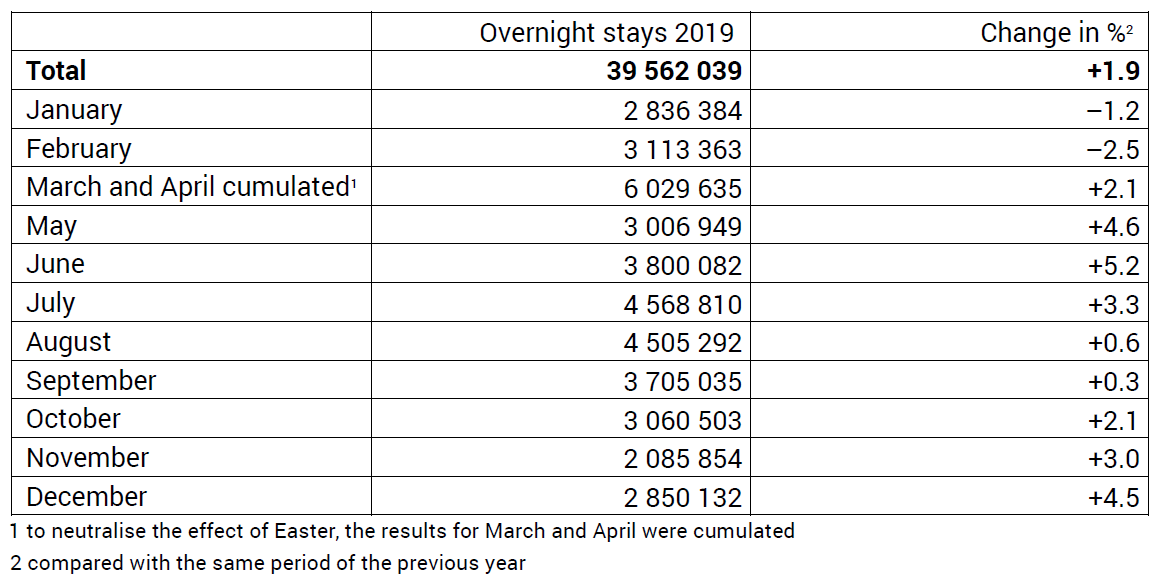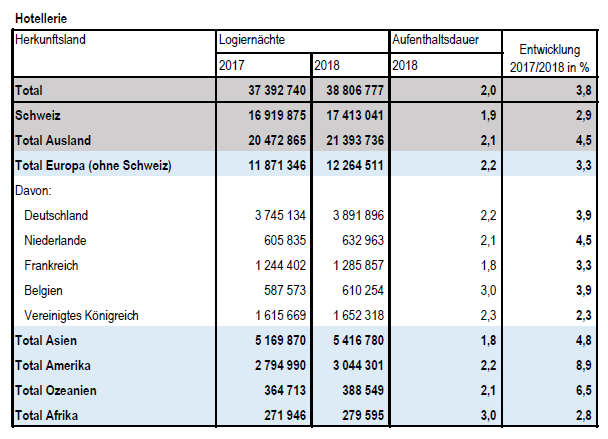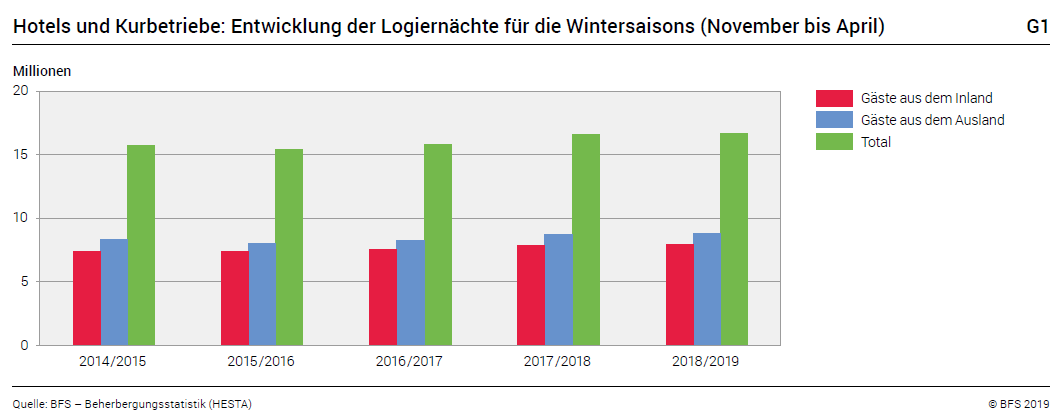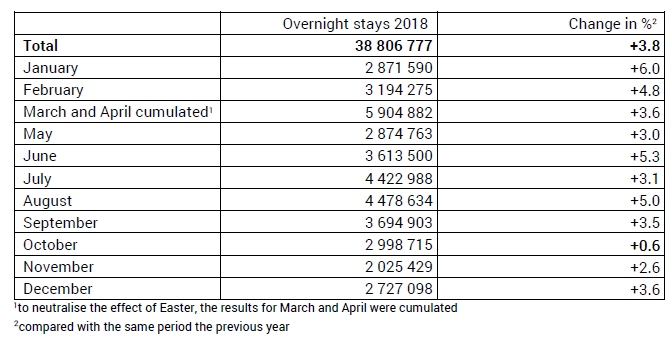Neuchâtel, 21.02.2017 (FSO) – The hotel sector registered 35.5 million overnight stays in Switzerland in 2016, representing a moderate decline of 0.3% (-96,000 overnight stays) compared with 2015. Foreign visitors registered 19.3 million overnight stays, a decline of 1.5% (-288,000). The number of overnight stays by domestic visitors (16.2 million) showed an increase of 1.2% (+192,000) and thus registering a positive result for the fourth consecutive year. In December 2016, 2.4 million overnight stays were registered, representing a decrease of 0.8% (-19,000). These are the final results from the Federal Statistical Office (FSO).
Decline in the first half-year; slight increase in the second half-year of 2016In 2016, seven months registered a drop in overnight stays. The greatest decreases were observed in the first half-year. In particular, the month of January alone recorded a decline of 191,000 overnight stays (-6.9%). In total, the first six months registered 16.9 million overnight stays, i.e. a decline of 1.0% (-165,000 overnight stays) compared with the same period in 2015. During the second half-year, more contrasted growth in overnight stays was seen. In the end, 18.7 million overnight stays were registered between July and December, showing a slight increase (+70,000 overnight stays / +0.4%) compared with the second half-year 2015. |
Hotels and health resorts Annual development of overnight stays 2012-2016(see more posts on Switzerland Number Overnight Stays, Switzerland Tourism, ) |
Rise in domestic demand, reverse in trend for Asian demandDuring 2016, domestic demand totalled 16.2 million overnight stays, i.e. an increase of 192,000 overnight stays (+1.2%) compared with the previous year. With a total of 19.3 million overnight stays, foreign demand posted a decline of 288,000 units (-1.5%). After several years of strong growth, visitors from the Asian continent registered a decline of 160,000 overnight stays (-3.4%) compared with 2015. This reverse in trend should be correlated with the strong decrease among Chinese clientele (excluding Hong Kong) which recorded the greatest drop (-248,000 overnight stays / -18.0%) of all countries of origin. Japan followed with a decrease of 34,000 overnight stays (-8.5%). In contrast, the Gulf States (+30,000 units / +3.2%) and the Republic of Korea (+22’000 / +7.1%) posted an increase in overnight stays. Decreasing sharply since 2009, overnight stays from the European continent (excluding Switzerland) declined once again in 2016 (-172,000 units / -1.5%). This fall was nonetheless less pronounced than in previous years. Among the countries of this continent, the largest absolute decrease was registered by Germany with 149,000 fewer overnight stays (-3.9%), showing a continuous decrease for eight consecutive years. Russia (-46,000 / -12.4%), Belgium (-28,000 / -4.9%), ltaly (-17,000 / -1.8%), France (-9800 / -0.8%) and the United Kingdom (-7200 / -0.4%) also registered decreases in overnight stays. The Netherlands registered a stable result (+530 / +0.1%) following several years of decline. By contrast, Spain registered an increase of 22,000 overnight stays (+5.6%). Visitors from the American continent continued to show an upward trend with a growth in overnight stays of 68,000 units (+2.8%). With 96,000 additional overnight stays (+5.5%), the United States registered the largest absolute increase from this continent. Finally, the continents of Africa and Oceania registered decreases of 24,000 (-7.9%) and 1600 overnight stays (-0.5%) respectively. Mixed results within the tourist regionsSeven out of fourteen tourist regions posted decreases in overnight stays in 2016 compared with 2015. It was mainly the mountain regions which showed the greatest falls. Firstly The Bernese Oberland showed a decline of 91,000 overnight stays (-2.4%). Graubünden (-90,000 overnight stays / -1.9%) and Valais (-70,000 / -1.9%) followed the same trend. The Lucerne/Lake Lucerne Region also posted one of the most pronounced decreases with a decline of 85,000 units (-2.4%). In contrast, the Lake Geneva Region (Vaud) posted the largest absolute increase with 121,000 additional overnight stays, representing an increase of 4.5%. This was followed by Ticino (+100,000 /+4.6%) and the Bern Region (+22,000 / +2.1%). Stability in length of stayIn 2016, the duration of stay was 2.0 nights (as in 2015). With 2.1 nights on average, foreign visitors’ stays are slightly longer than those of Swiss visitors (2.0). Among the tourist regions, Graubünden recorded the longest stay with 2.7 nights, followed by Valais with 2.4 nights. The shortest stay was registered in the Fribourg Region with 1.6 nights. Net occupancy rate of roomsDuring 2016, the net room occupancy rate was 51.3% (compared with 51.5% in 2015). Of all tourist regions, Geneva showed the highest rate at 63.5%. This was followed by the Zurich Region with a rate of 63.0%. The lowest rate was 38.4% which was recorded by the Jura and Three Lakes region. |
Hotels and health resorts: Monthly development of overnight stays 2012-2016(see more posts on Switzerland Number Overnight Stays, Switzerland Tourism, ) |
Decline in overnight stays in December 2016In December 2016, 2.4 million overnight stays were registered in hotels, i.e. a decline of 19,000 units (-0.8 %) compared with the same month the previous year. Foreign demand registered a total of 1.3 million overnight stays, i.e. an increase of 7400 units (+0.6%). Domestic visitors registered 1.1 million overnight stays, i.e. a drop of -26,000 units (-2.3%). In December 2016, visitors from Germany registered the largest absolute decline, i.e. a decrease of 10,000 overnight stays (-3.8%) compared with December 2015. This was followed by declines from the United Kingdom (-7900 / -5.8%), Italy (-7800 / -7.9%), the Netherlands (-7100 / -15.8%) and Belgium (-5700 / -13.0%). Visitors from the United States, for their part, registered the largest absolute increase, with an additional 13,000 overnight stays (+13.7%). These were followed by visitors from Spain (+6200 / +19.4%) and India (+3600 / +22.2%). Seven out of fourteen tourist regions posted declines in overnight stays in December 2016 compared with the same month a year earlier. With poor snow conditions, the mountain regions showed the greatest absolute falls. Graubünden registered a decline of 17,000 overnight stays (-3.8%). This was followed by the Bernese Oberland (-14,000 units / -6.7%) and Valais (-13,000 / -3.9%). In contrast, the city regions held up well, especially the Basel Region which posted the largest absolute increase with 13,000 additional overnight stays, representing an increase of 12.5%. |
Change of overnight stays by country, 2015 - 2016(see more posts on Switzerland Number Overnight Stays, Switzerland Tourism, ) |
German Release: Link to PDF
English Release: Link of PDF
Full story here Are you the author? Previous post See more for Next post
Tags: newslettersent,Switzerland Number Overnight Stays,Switzerland Tourism









